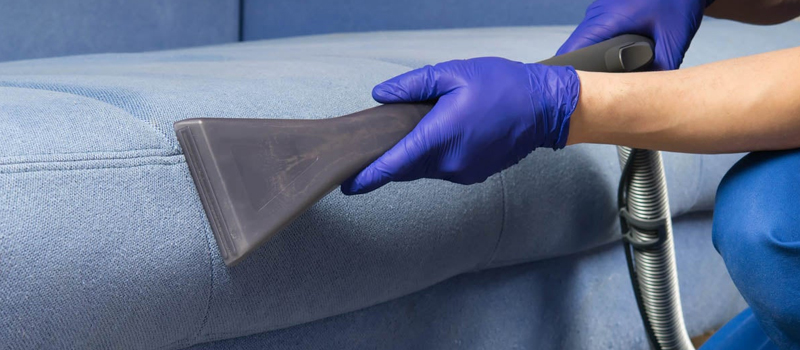How Upholstery Cleaning Improves Indoor Air Quality? Check the Health Benefits of Upholstery Cleaning
In today’s fast-paced world, the importance of maintaining a healthy living environment cannot be overstated. One often overlooked aspect of a healthy home is indoor air quality. The air we breathe indoors can be filled with various pollutants, including dust, allergens, and pet dander. These contaminants can have a detrimental effect on our health. This is where upholstery cleaning becomes crucial, as it plays a vital role in improving indoor air quality and promoting better health. In this blog “Health Benefits of Upholstery Cleaning” we will focus on how upholstery cleaning improves indoor air quality and your health, details about indoor air quality, and different tips for upholstery cleaning for maintaining this in your everyday life.

Understanding Indoor Air Quality
Indoor air quality refers to the quality of the air within buildings and structures, particularly as it relates to the health and comfort of the occupants. Poor indoor air quality can lead to a range of health issues, including allergies, asthma, respiratory problems, and even long-term complications. Common pollutants found in indoor air include dust, pollen, mold spores, pet dander, and volatile organic compounds (VOCs).
The Role of Upholstery in Indoor Air Quality
Upholstery, such as sofas, chairs, and couches, can act as a magnet for airborne particles and pollutants. Over time, these contaminants accumulate within the fabric fibers, making upholstery a potential source of poor indoor air quality. Dust mites, allergens, and pet dander are notorious for getting trapped in upholstery, exacerbating the issue, and contributing to respiratory issues or allergies among household members.
How Upholstery Cleaning Improves Indoor Air Quality and Your Health
What are the Health Benefits of Upholstery Cleaning? well, upholstery cleaning plays a crucial role in improving indoor air quality and promoting better health. Here are some ways in which upholstery cleaning contributes to these benefits:
Improved Air Circulation: Clean upholstery allows for better air movement within the living space. By removing the layer of accumulated dust and pollutants, clean upholstery prevents stagnant air and reduces the chances of moisture buildup, which can lead to mold growth and further deterioration of indoor air quality.
Enhanced Indoor Air Quality: Upholstery cleaning directly contributes to overall indoor air quality improvement. By eliminating the pollutants that reside within the fabric, the air becomes cleaner, fresher, and safer to breathe. This, in turn, promotes respiratory health and prevents potential allergic reactions.
Removal of Allergens: Upholstered furniture such as sofas, armchairs, and mattresses can harbor allergens like dust mites, pollen, pet dander, and mold spores. These allergens can trigger allergies and respiratory problems. Regular upholstery cleaning helps remove these allergens, reducing their presence in the indoor environment and minimizing the risk of allergic reactions.
Dust and Debris Removal: Over time, dust, dirt, and debris accumulate on upholstery surfaces. When disturbed, these particles become airborne and circulate in the indoor air, leading to poor air quality. Cleaning upholstery eliminates these contaminants, preventing them from being released into the air and reducing respiratory irritants.
Mold and Mildew Prevention: Moisture and humidity can contribute to the growth of mold and mildew on upholstery. Mold spores released into the air can cause respiratory issues and allergic reactions. Proper cleaning and maintenance of upholstery help remove excess moisture and inhibit the growth of mold and mildew, thus safeguarding indoor air quality.
Odour Elimination: Upholstery can trap unpleasant odours from various sources such as pets, food spills, and smoke. These odours can linger and affect the indoor environment. Thorough cleaning of upholstery helps eliminate these odors, refreshing the air and creating a more pleasant living space.
Psychological Well-being: A clean and fresh environment can have positive effects on mental health and overall well-being. Removing dirt, stains, and odours from upholstery not only improves the physical air quality but also creates a visually appealing and comforting space, promoting relaxation and reducing stress.
To maximize the benefits of upholstery cleaning for indoor air quality and health, it is advisable to follow professional cleaning recommendations or consult upholstery cleaning specialists. They can provide specialized techniques and products to ensure effective cleaning while preserving the integrity of the upholstery fabric.
Maintaining Clean Upholstery and Indoor Air Quality
After knowing, how upholstery cleaning improves indoor air quality and your health, you must know the tips to ensure the longevity of the improved indoor air quality and the benefits of upholstery cleaning. This means it is essential to establish proper maintenance practices given below:
1. Regular Vacuuming: Regularly vacuuming upholstery helps remove surface dust and dirt, preventing them from settling deeper into the fabric. Use a vacuum cleaner with a suitable attachment to effectively clean all areas, including crevices and corners.
2. Prompt Stain Treatment: Immediate stain treatment is crucial to prevent stains from setting in and becoming more challenging to remove. Use appropriate stain removal techniques and products recommended for the specific upholstery fabric.
3. Establishing a Cleaning Schedule: Create a routine for upholstery maintenance based on your usage and environment. Consider factors such as the presence of pets, high foot traffic, or exposure to outdoor elements. Regular cleaning, ideally with professional steam cleaning, stain removal, deodorization and sanitisation services, will help maintain optimal indoor air quality.
Conclusion: Health Benefits of Upholstery Cleaning
Prioritizing indoor air quality is crucial for promoting good health and well-being. Upholstery cleaning plays a significant role in improving indoor air quality by removing dust, allergens, and pollutants that accumulate within the fabric. This cleaning not only enhances air circulation but also contributes to better respiratory health and prevents allergies and related complications. By incorporating regular maintenance practices, such as vacuuming, stain treatment, and adhering to a cleaning schedule, you can ensure a healthier living environment for you and your family. Take the necessary steps today to prioritize upholstery cleaning and enjoy the benefits of improved indoor air quality.
